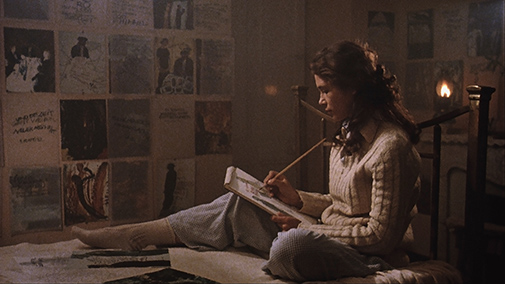
by Amy Stone
Where the Women Are (At the 22nd Annual NY Jewish Film Festival)

Life? Or Theatre?
Dutch director – male – obsessed with tragic German artist – female. German auteur filmmaker – female – honing in on interplay of intellect and sexuality driving renowned German-American political theorist – also female. Polish filmmakers – male – documenting a Polish town’s response to death camp transports but failing to get the only known survivor dropped from a train, a woman, to talk.
What do this year’s NY Jewish Film Festival offerings say about the roles of Jewish women when women and men make film? From a wide-ranging two weeks of domestic and international films, here come snapshots of three Shoah-related films: one documentary, one feature, one documentary short.
Long-time Dutch filmmaker Frans Weisz is a man obsessed with artist Charlotte Salomon, the subject of his 1981 feature film “Charlotte” and his freewheeling documentary, 30 years later, “Life? Or Theatre?”
Poor Charlotte. The shy, almost invisible, middle-class German Jew. She had one passionate relationship in Nazi Berlin before fleeing to the relative safety of a wealthy American woman’s chateau in the south of France. As Hitler destroyed European Jewry, Charlotte worked out her own life story in Leben? oder Theater? Diving into this massive work was her response to learning of her family’s hidden history of suicide, including her own mother. (Now in Amsterdam’s Jewish Historical Museum, the nearly 800 gouaches are like the storyboard for a musical, a three-part life story with acts and scenes, with tracing-paper overlays of comments and musical notations. The artist pared them down from an outpouring of some 1,300 pieces.)
Weisz traveled into the mystery of Charlotte Salomon every which way – clips from his feature film, interviews, her art, the unnerving contents of a letter never before revealed. But why doesn’t the film tell of the seemingly fatal mistake of Charlotte or her husband insisting on registering their marriage with the local authorities, presumably leading to her deportation and death in Auschwitz? Weisz: “It’s in the footage.” Director loses his way in the life and theater of Charlotte Salomon, with crucial information left on the cutting-room floor. And somehow we’ve lost Charlotte along the way.
Famous and not-so-famous men in the festival’s documentaries: Ed Koch (the film’s New York premiere at the festival was followed by the Feb. 1 commercial opening on the day of Hizzoner’s death), Joseph Papp, Art Spiegelman and “Doc Pomus.” One woman, Hannah Arendt, gets provocative biopic attention from German director Margarethe von Trotta. The subject is Arendt’s coverage of Eichmann on trial in Jerusalem. Director von Trotta loves the female friendship of Holocaust survivor Arendt and all-American Mary McCarthy – two brainy women who enjoyed playing the sex card as they held their ground among New York’s male intellectuals. But German female director gets seduced by Arendt and gives her the last word on her analysis of Eichmann as nothing more than a bureaucrat doing his job in “the banality of evil.”
Perhaps the most haunting woman is the woman absent from the Polish/U.S. documentary “Castaways.” Making its world premiere at the festival, it’s a heartbreaking gem of a 17-minute film by two male directors, Slawomir Grünberg and Tomasz Wisniewski (Grünberg has lived in the U.S. since ’81) and their female editor, Katka Reszke.
Grünberg interviewed locals in the Polish town of Lapy, en route to Treblinka. Now in their 80s and 90s, under Nazi occupation they witnessed tiny children dropped to the tracks from death camp transports by loving parents hoping to save them. Only one was not murdered, a pretty little girl rescued by a Catholic family. She refused to be interviewed. Not even her name was revealed. (Back story recorded on Reszke’s website). Even though the whole town knows her history, she is in such denial that she even denies that all the town knows. An aging woman who will not even tell her story to her children, this unnamed woman’s hidden past cries out for a life beyond the documentary.
When it comes to directing, women held their own at the festival, co-sponsored by The Jewish Museum and the Film Society of Lincoln Center. The festival itself is directed by the Jewish Museum’s Aviva Weintraub. There were roughly three films by or co-directed by women for every four films by or co-directed by men. This is encouraging, compared with the data that only nine percent of the top-grossing 250 films at U.S. theaters last year were made by female directors. And that’s substantially higher than the 2011 figure of five percent.
The 22nd annual NY Jewish Film Festival – films on the Jewish experience – ran through Jan. 24. Watch for screenings on the film festival circuit, both Jewish and non-Jewish.